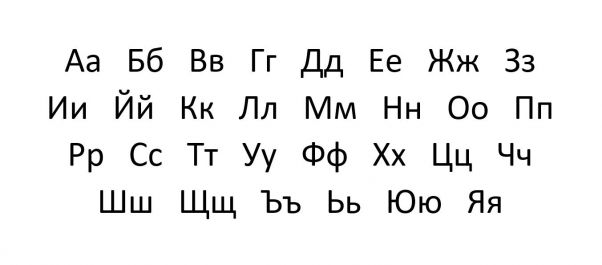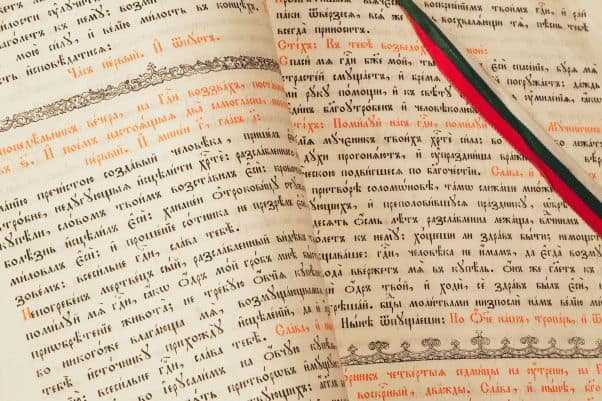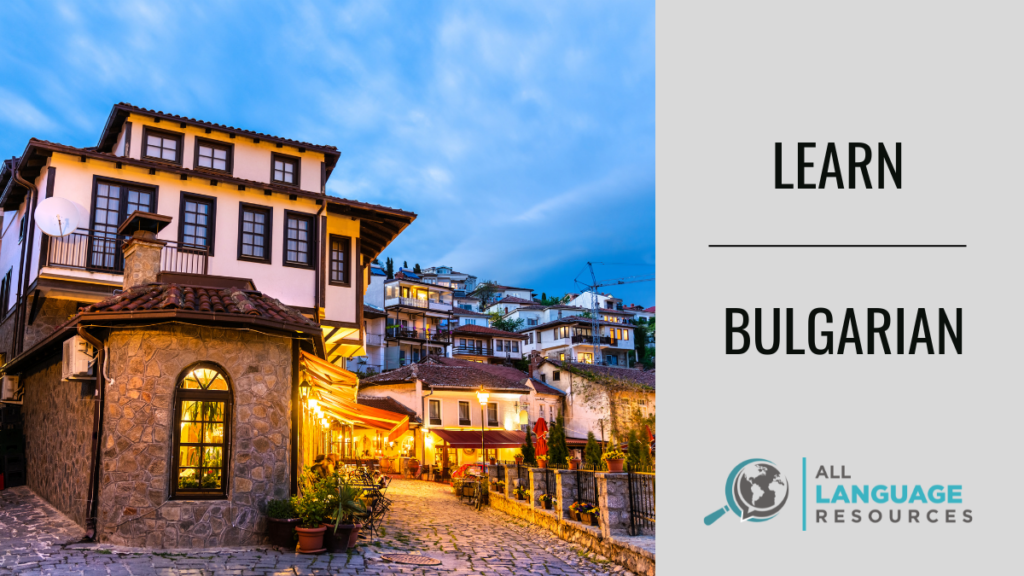They say that people learn Bulgarian for love, not business – but no matter why you’re doing it, studying Bulgarian is a rewarding undertaking.
And whether you want to visit Bulgaria’s gorgeous mountains or historic cities, chat with warm-hearted Bulgarians in your own hometown, or immerse yourself in the country’s poetic and powerful literature, there are plenty of reasons to start learning this undervalued language.
Begin learning Bulgarian on your own with our comprehensive guide. Explore vocabulary, grammar, and Cyrillic alphabet at your own pace. Start learning today!
About the Bulgarian Language
Around 15 million people speak this Southern Slavic language, which is also mutually intelligible with Macedonian and closely related to Serbian, Croatian, Bosnian, and Slovenian.
Some words will sound familiar to speakers of Romance languages since Bulgarian is influenced by Latin, French, and Italian, as well as Russian, Greek, Arabic, and German. English loanwords are also increasingly common, such as чат (čat), which means text or internet chat, and тост (tost), which means toast.
Turkish has also contributed a large number of loanwords. Bulgaria was conquered by the Ottoman Empire in the late 14th century and continued under Ottoman rule until its unofficial independence in 1878 (followed by a formal declaration of independence in 1908). Hundreds of years of influence have led to distinct similarities between Turkish and Bulgarian words for everyday objects such as clothing and food.
Bulgarian and the Invention of the Cyrillic Script
Bulgarian was originally transcribed in Glagolitic script – the oldest Slavic alphabet. However, unless your aim is to study historical Bulgarian texts from the ninth to the twelfth century, you won’t need to study Glagolitic and can instead busy yourself with Cyrillic.
Cyrillic was created in the ninth to tenth century in the Preslav Literary School in Pliska, the ancient capital of the Bulgarian Empire, under the orders of the Bulgarian Tsar Simeon I the Great.
And under the Bulgarian Empire, it spread across Eurasia. According to the Bulgarian Presidency of the Council of the European Union, more than 300 million people use the Cyrillic alphabet. It’s the script of Russian, Ukrainian, Serbian, and many more.
Yet although Russian and Ukrainian speakers might have a head start on the script, they will still have to learn the Bulgarian version of it, which uses fewer characters and has some differences in pronunciation.
The modern Bulgarian alphabet uses 30 Cyrillic letters, 6 of which are vowels. Although some of them bear similarities to Roman script, don’t make the mistake of pronouncing them the same way. “P” is closer to an “R” sound, while Я sounds more like “ya” (and is a vowel).
Here’s the Bulgarian alphabet in full:

How to Learn Bulgarian
Your Bulgarian language journey is going to be a lot easier once you’ve mastered the alphabet. Doing so will enable you to use more textbooks, apps, and language courses – and help you out with street signs if you eventually visit the country.
Fortunately, with just 30 characters, you can probably master this quite quickly. In fact, we suggest learning this before you start to work on any vocabulary or phrases – even Здравей (Zdravey) or “Hello.”
Once you’ve got the alphabet sorted, you’ll be ready to dive into the world of Bulgarian grammar, vocabulary, listening, and more.
Your main focus will probably depend on your language goals. Want to make local friends? Listening, speaking and informal expressions will be essential. Interested in Bulgarian literature? Focus on reading. Hoping to stay in touch with a Bulgarian exchange student? You’ll need to work on writing for all those online messages.
Yet while effective language studies won’t necessarily hone all skill sets to the same degree, your studies will probably benefit from a certain amount of balance. Try to find a language-learning routine that allows you to practice your reading, writing, listening, speaking, vocabulary, and grammar – even if it’s more weighted towards some elements than others.
Perhaps even more importantly, be kind to yourself. Don’t overwhelm yourself by taking on too much at once. Aim to study for shorter periods but more frequently, and don’t beat yourself up if you get off track.
Remember that learning a language is a marathon rather than a sprint. It’s better to go slowly but consistently than push yourself too hard and become demotivated.
In fact, you may find one of the best ways to learn Bulgarian is by adopting a little айляк (aylyak), a Bulgarian concept for taking things easy, enjoying the moment, and going at your pace.
Is Bulgarian Hard to Learn?
The difficulty of Bulgarian depends on various factors such as your native language, your previous language learning experience, and your dedication to the learning process.
Bulgarian uses the Cyrillic alphabet, which may be brand new to speakers of languages that use the Latin alphabet (such as English). Learning a new script can pose a challenge initially, but the Cyrillic alphabet is phonetic, meaning that each letter represents a specific sound.
If you speak another Slavic language, you might find learning Bulgarian easier due to shared vocabulary and linguistic similarities. However, for speakers of non-Slavic languages, some words and expressions might be entirely new.
How Difficult Is Bulgarian?
Bulgarian is not the world’s easiest language to learn. But let’s be honest, you probably aren’t considering picking it up for its simplicity, are you?
And we have some good news for you: the pronunciation is relatively easy – especially compared to English. The vowels, for example, are always pronounced the same way.
You do have to learn a new alphabet (which we will cover in more detail below), but there are only 30 letters. That’s more than in English, but the writing system is much simpler than many Asian languages such as Chinese, Japanese, and Thai.
Contemporary Bulgarian has roughly 200,000 words, which isn’t much more than English (171,476). And while you may find yourself equally amazed and exasperated by the number of ways to say “but,” you’ll also find that this facilitates a rich, persuasive, and elegant way of speaking. You’ll love the poetic beauty of Bulgarian literature.
Bulgarian grammar will probably be the most frustrating part of your language journey. Yet while it is trickier than English grammar, it isn’t as challenging as German or other Slavic languages. There will be some things that English speakers recognise, such as articles (e.g. “the”) and heavy use of conjunctions.
There are three grammatical genders: masculine, feminine, and neuter. If a word ends in a consonant, it’s usually masculine – but, like with most languages, there are some exceptions to the rules. Nouns and adjectives demonstrate the gender, as well as if the object is plural or singular.
There are technically three different cases – accusative, dative, and nominative – but in modern Bulgarian, these are only used with personal pronouns. The accusative marks the direct object (You introduced her to me), the dative marks the indirect object (You introduced her to me), and the nominative marks the subject (You introduced her to me). As far as cases go, this makes Bulgarian significantly easier than other Slavic languages and also German.
On the other hand, the language has thirty different tenses once you take into account the subjunctive (“If I were you”), imperative (“Do it!”), and conditional.
Yet once you’ve got your head around the grammar, you’ll find that learning Bulgarian opens the door to a country with breath-stopping landscapes, a fascinating history, and friendly locals.

What’s the Best Way to Learn Bulgarian?
A combination of learning methods will help you master Bulgarian. Using a range of methods will help you learn different material in different ways and stop you from getting bored.
If possible, enroll in a formal language course or buy a structured textbook. This will give you a progressive structure for your learning. Websites like BulgarianPod101, iTalki, and FluentU offer lessons, videos, and exercises for language learners.
Try to surround yourself with Bulgarian media. Bulgarian movies, music, and books are harder to find than other language media, but having something on in the background while you cook or clean will help your passive recognition.
How Long Does It Take to Learn Bulgarian?
Linguists estimate that a native English speaker will need 1100 hours of study to reach C1 in Bulgarian. If you’re taking a full time Bulgarian course (5 hours per day, 5 days per week) it will take a year to go from A0 (complete beginner) to C1 (advanced speaker).
There are certain factors that can either shorten or lengthen this amount of time, including:
Language Learning Experience: If you’ve successfully learned another language before, you might find it easier to pick up Bulgarian because you’ve already developed language learning strategies.
Motivation: Your motivation and reasons for learning Bulgarian can impact how quickly you learn. If you’re passionate about the language or have a specific goal, you’re more likely to stay committed to the learning process.
How Do I Learn Bulgarian Fast?
The fastest way to learn Bulgarian is to focus on conversation skills. You should prioritize learning practical, everyday phrases and expressions as this will help you to engage in basic conversations sooner, making your learning experience more rewarding.
Following on from this, speak from Day One. Don’t be afraid to start speaking Bulgarian from the very beginning. Practice with native speakers, language exchange partners, or language tutors. Speaking early on helps build confidence and improves your oral skills rapidly.
Finally, remember that consistency is key. Dedicate daily time to practicing Bulgarian, even if it’s just for a short period. Regular exposure helps reinforce what you’ve learned.

Additional Resources for Learning Bulgarian
Aside from lessons, courses, and apps, you’ll find many other tools that could come in handy when learning Bulgarian. Try mixing it up when learning and expose yourself to how the Bulgarian language is used in different contexts and registers.
Bulgarian Textbooks and Reference Books
Sometimes, a traditional textbook or reference book can help you structure your learning or master a tricky grammatical concept.
The Step by Step: Bulgarian Language and Culture for Foreigners (A1) (Bulgarian Edition) series will take you through beginner-level (A1 and A2) Bulgarian.
Intensive Bulgarian, Vol. 1: A Textbook & Reference Grammar is dated but popular among learners, while Bulgarian: Beyond the First Steps is designed for self-study. You will need to have already mastered the Cyrillic alphabet, however. Grammar Matters: Bulgarian Grammar in Charts will help you tackle the language’s challenging grammar, while Verb Activator for 212 Bulgarian Verbs breaks down verb conjugation in detail.LiveLingua has a selection of scanned and uploaded textbooks from bodies such as the Peace Corps, FSI, and more, along with the official audio clips. The quality of these can vary according to the original publisher.

Bulgarian Fiction Books and Poetry
Ready to start tackling Bulgarian novels? Bulgarian literature is poetic, political, and powerful. It often tackles the country’s turbulent past as well as its relationship with the West.
Deyan Enev is a popular contemporary short story writer who questions the relationship between democracy, happiness, and prosperity. Since much of his work is flash fiction, it will not only give you an insight into the country’s culture but also make for an easier introduction to Bulgarian literature.
Meanwhile, Katerina Hapsali’s multi-award-winning Гpъцкo кaфe (Greek Coffee) explores recent Balkan history through the lens of motherhood and relationships. Her newest novel Сливовиц (Slivovitz) is also highly rated, as is her poetry.
Looking for Bulgarian classics? Aleko Konstantinov’s Bay Ganyo is Bulgaria’s answer to Don Quixote. The satirical novel shares the story of the anti-hero’s travels throughout Europe and eventual return to Bulgaria.
Jewish writers have also made significant contributions to Bulgarian literature, especially over the last century. Start with the poets Valeri Mevorah, David Ovadia and Salis Tadjer.
If novels and poetry are too challenging for now, you might want to begin with children’s books. You can download several here, although not all of them were originally written in Bulgarian. You’ll also find a wide range on Amazon, such as КОТКАТА-ЛЕЧИТЕЛКА and Maya i kontzertat na talantite (Феята Розичка и българските деца по света) (Bulgarian Edition).
Slovo is another source for original Bulgarian texts, but you’ll need to understand Bulgarian (or use Google Translate) to use it.

Other Media Resources in Bulgarian
Take a look at typical news sites, too, such as Bulgaria Dnes and 24часа. If you come across an unfamiliar word, you can turn to English-Bulgarian dictionaries such as Ectaco and NewObjects. Or, if you’re confident with a Bulgarian-only dictionary, use Rechnik.
Meanwhile, listening to Bulgarian music can help you pick up new words and phrases without feeling like you’re studying. Just make sure these are appropriate for everyday use before you try them out in conversation – you don’t want to accidentally pick up disrespectful terms from listening to Bulgarian rap, while chalga or pop-folk lyrics may at times be overly metaphorical.
Not sure where to start? Search for playlists on Spotify, such as Bulgarian Pop Hits and Bulgarian Pop-Folk Hits, or listen to popular radio shows such as BG Radio, Radio Veronika, and bTV Radio.
On the topic of radio, Radio Bulgaria’s website provides a mixture of articles and news-based radio recordings.

There’s no shortage of resources for learning Bulgarian. In fact, one of the trickiest things might be deciding where to get started.
Remember that not all language learners are the same. Your ideal Bulgarian app or book won’t necessarily be someone else’s favorite. Don’t be afraid to switch to a new resource if you find yourself getting too bored or frustrated – with so many options, you’ll be able to find the right one for you.
So, what are you waiting for? Try a few out, find the ones that work for you, and then create your study routine. You’ll be surprised by how quickly you pick up this beautiful language.


your site is wonderful; thanks for all the tips